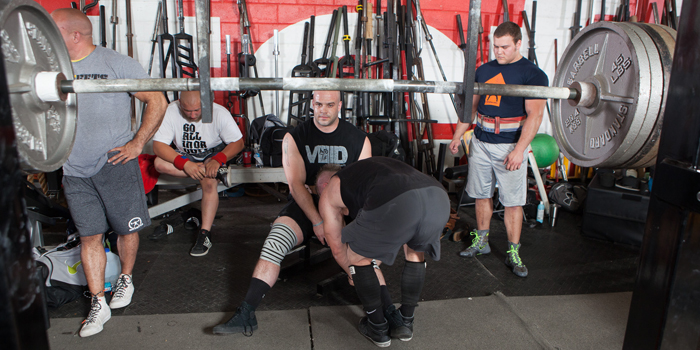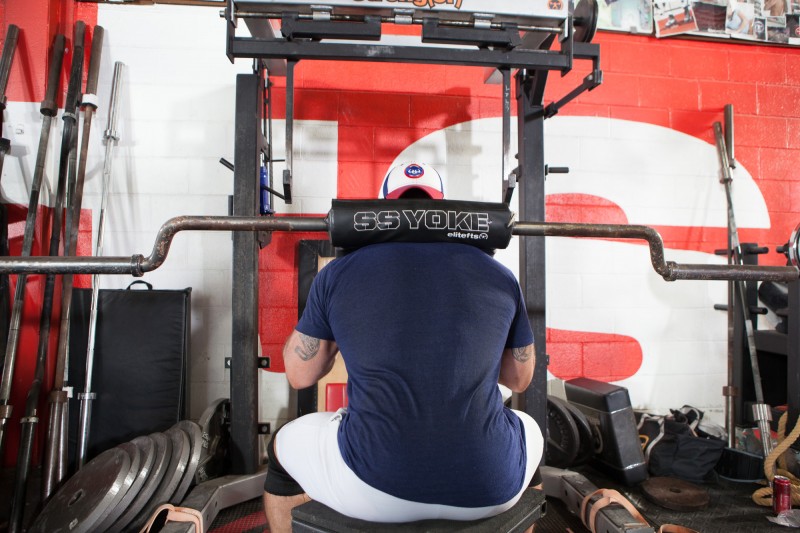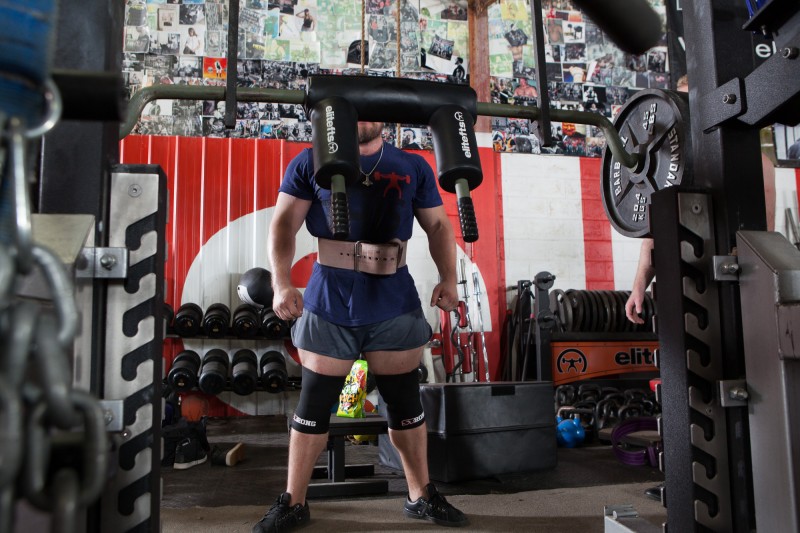
2004 elitefts Classic
I have been powerlifting for approximately five years. My best total before I came to Westside Barbell was 1685. After training at Westside for a little over three years, my best total is 1950 with plenty of room to spare on the platform. (Side note: ergonomic aids did not play a part in the increase. I took more aids before I came to Westside.) Over the years I, like many other powerlifters, realized I made many mistakes that, had I known beforehand, I should not have made. From traveling to various gyms and watching visitors at Westside, here are few of the biggest mistakes that many beginning and even some experienced powerlifters make.
Not Having a Solid Foundation
A lifter cannot start out powerlifting thinking he is going to get under a bar and squat huge numbers. Powerlifting is sport of time and patience. In order to support big weights, you have to have a strong foundation. Think about it. Engineers don’t start building a skyscraper without a solid foundation. The same holds true for powerlifting. Beginners should stick to the basic movements or variations thereof: squats, benches, and deadlifts. Some movements like good morning squats are just too complex for a beginner to handle. The motor units and central nervous system have not been developed at this early stage to handle a movement such as this with heavy weights. Before you run, you have to learn how to walk.
One of my biggest pet peeves (I have many) is when I see beginner lifters using steroids without having any clue what they are doing, and thinking the anabolics alone are going to make them strong. Sorry, it does not work that way. Nothing—absolutely nothing—is a substitute for hard work. You can take all the steroids in the world and still not be a great powerlifter. I have yet to see a bottle of testosterone squat 1000 pounds.
Putting Ego in Front of Logic to Sacrifice Technique
Did you ever watch the old Star Trek? Remember Dr. Spock? He had many great lines in that show, but one of the best is, “Emotions (feelings) are illogical.” Remember this line when you find out your girlfriend cheated on you. Your ego is emotion. If you cannot handle the weights of your training partners, do not try. You are only going to get hurt and push back your progress.
Do not take this the wrong way; I am not stating to not push yourself. However, I am stating that you should never sacrifice form and technique for ego. Putting your ego first only leads to bad form and technique. Form and technique plays a huge role in powerlifting. There are many powerlifters who have the raw strength to bench 700 pounds, but their technique is not there yet. The more you practice in the gym on your form, the bigger the rewards on the platform.
From a personal note, the mistake of putting ego in front of logic took me some time to overcome. I train with the morning crew, which consists of Lou, Dave, Chuck, Jim, JL, Mike, Fuzzdog, Joe, Jerry O, and Jeremiah, to name a few. All of these lifters are heavyweights and I am a 198 or 220-pound lifter. My ego wanted to keep up with them, but my technique would falter. I started to get much stronger when I put my ego behind me and focused on form and technique.
A more specific example that perhaps you could relate to would be the weights used when I performed reverse hyperextensions. I used the same weights as Lou, Dave, Chuck, and the others (about 450 pounds) yet could not even squat 700. My training partners used the same weight and squatted between 900 and 1000 pounds. Why? I was putting my ego ahead of technique and not using logic. My strength was there, but my technique was not. In every movement you do, focus on technique. Just going through the movements is only going to hinder your performance.
Poor Coaching and Training Partners
I think you all know how the majority of us feel about coaches. There are very few good coaches in high school and college, let alone powerlifting. They went to college and were able to put some letters after their name and suddenly think they crap gold. Why would anybody listen to a guy who looks like they could not squat off a toilet, let alone 700 pounds? You don’t get sex advice from a virgin, do you? If I want to improve my deadlift, I ask a good deadlifter, not a good bencher. Find a good coach that is a good all-around lifter and has at least totaled elite. It also helps if he has an open mind and is willing to change lifting routines and techniques (like using chains and bands, trying different bars and equipment, incorporating different movements, etc.) and is not stuck in the Stone Age.
Training partners are imperative to your improvement in the sport. They help spot, critique your form, motivate you, and push you to perform better. If your training partners show up sporadically, late, hungover, etc., throw them out. They are only holding you back. A good training partner will tell you what is wrong with your form and technique, help you figure out how much to jump in weight for your next attempt, etc. I could not ask for better training partners. Without them, I could never have made the gains I did and will continue to make.
Poor Nutrition
I am probably the last person to talk about nutrition because I am a fat pig, so I will make this very short. Make sure you take in enough protein, vitamins and minerals, and water to help aid in strength and recovery.
Be a Pit Bull
When I first started coming to Westside Barbell, Chuck asked me something I will never forget: “Do you want to be a pit bull or a poodle?” In the sport of powerlifting, you have to have the attitude of a pit bull. If you have the attitude of a poodle then this sport is not for you. Perhaps the local sporting goods store is having a sale on golf equipment.
Here is an example. I have a 130-pound bullmastiff named Samson. I also have a 45-pound pit bull named Daisy. If Samson is chewing on a bone, Daisy wants it and tries to take it. Even though Samson outweighs her by almost 100 pounds and growls and snaps at her, she does not care. She has a goal and nothing is going to stop her from getting what she wants.
WATCH: Table Talk — How Should a 15-Year-Old Begin Training for Powerlifting?
Many a year ago, when I was in the Marine Corps, I had the chance to train with fellow Marines trying out for Recon (it is comparable to the Green Berets or Rangers of the Army). The initial physical qualifying test goes something like this: perform pull-ups, sit-ups, and run five miles with an 80-pound pack in boots. After you complete the run you then jump into a pool, with boots and the pack, strip off the pack, and wade in the water for a certain amount of time. A man whipped everyone in the pulls, sits, and the run. When it was time for him to jump into the pool, he stood at the ledge for a second of hesitation and jumped in. He went down like a whore on prom night. After some time the instructors realized he wasn’t coming up and the rescue divers brought him up and resuscitated him.
“What’s the problem?” the instructors asked. “I can’t swim,” replied the Marine. “Why the hell did you jump in then?” asked the instructors. The Marine yelled, “Because I want to be Marine Recon!” Sure enough, they taught that man how to swim and, from what I heard, he became a member of Force Recon. That Marine had the attitude of a pit bull. He had a goal and nothing was going to stop him.
That is exactly the attitude a successful powerlifter must have. Look at the great lifters on the platform. Not only do they act and look like nothing is going to stop them from making an attempt, they KNOW nothing is going to stop them. They are pit bulls!
Public health officials have concluded that possible serious health problems exist that are associated with the misuse and/or abuse of performance enhancing drugs, including anabolic steroids. All athletes should rely on these messages in making all performance and health-related decisions.
elitefts believes that all athletes should be guided by the conclusions of health officials and medical professionals regarding the health effects of performance enhancing drugs, including anabolic steroids, when deciding whether or not to incorporate these substances in their training regimes.











